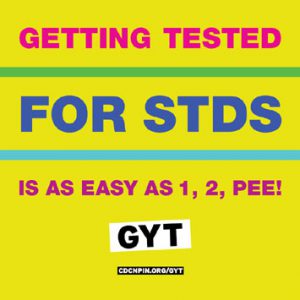Planned Parenthood offers no-to-low-cost testing and treatment
By Angela Reed-Smith
 Did you know that one in two sexually active young people in the U.S. will contract a sexually transmitted disease by the time they’re 25 — and that most won’t even know it? Or that young people account for the largest percentage of new HIV infections in the U.S. each year?
Did you know that one in two sexually active young people in the U.S. will contract a sexually transmitted disease by the time they’re 25 — and that most won’t even know it? Or that young people account for the largest percentage of new HIV infections in the U.S. each year?
This April, STD Awareness Month, the most important part of the month isn’t avoiding pranks or getting caught in April showers: it’s encouraging young people to educate themselves on sexually transmitted diseases (STDs) and to get themselves tested.
Many sexually active young people may not realize that getting tested is part of basic preventive health care. But in fact, STDs continue to disproportionately affect young people. Half of the estimated 20 million sexually transmitted diseases in this country each year occur in people under 25, even though they represent only 25 percent of the sexually active population.
That’s why Planned Parenthood has joined with MTV, the Kaiser Family Foundation, and other organizations for the sixth year of the award-winning Get Yourself Tested (GYT) campaign. GYT is a national campaign that includes on-air, online, and on-the-ground activities designed to promote sexual health among young people and address the disproportionately high rates of STDs — including HIV, chlamydia, and gonorrhea — among those under 25.
A few things young people should know about getting tested and STDs:
Getting yourself tested for STDs is one of the most important things you can do to protect your health. STDs, if not treated, can lead to serious health outcomes such as increased risk of cervical cancer and infertility.
Getting tested is easy, quick, and painless. For example, rapid HIV tests can provide results in 20 minutes from just a swab in the mouth. For other tests, all you have to do is urinate in a cup. No needles necessary.
The good news is that most STDs, including HIV, are treatable, and many are curable. The sooner you know your status, the sooner you can get treated. Not all medical checkups include STD testing — so unless you ask to be tested, don’t assume you were the last time you saw your doctor.
You can’t tell by looking at someone if they have an STD. Many STDs cause no symptoms. For example, 75 percent of women and 50 percent of men with chlamydia have no symptoms. On average, people with HIV don’t develop symptoms for 10 years. The only way to know your status for sure is to get tested.
Getting tested is important no matter who you are or where you live. Unfortunately, some communities are harder hit by STDs like HIV than others. African Americans and Latinos account for dramatically disproportionate rates of new HIV infections. For African-American women, the rate of new HIV infections is 20 times higher than that for white women.
For Latinos, the rate is more than three times higher than that of whites. Overall in the U.S., men who have sex with men have the highest rates of HIV nationwide.
Planned Parenthood is proud to offer affordable STD testing, treatment, and sex education and information to help ensure that young people stay healthy and safe. We work every day to reduce the rates of sexually transmitted infections — and our doors are open to everyone. We provide education programs in schools and communities to more than one million people every year — including sex education, peer education, parent-teen workshops, and support groups for LGBTQ teens. And Planned Parenthood uses digital education tools, a chat/text program, and social media to get important health information to young people every day.
This April, spread the word that STD testing should be a routine part of your health care checkups — especially if you’re a sexually active young person. It’s one of the easiest and most important things you can do to protect your health.
Angela Reed-Smith is the senior Vice President of Plan-ned Parenthood of the Pacific Southwest.